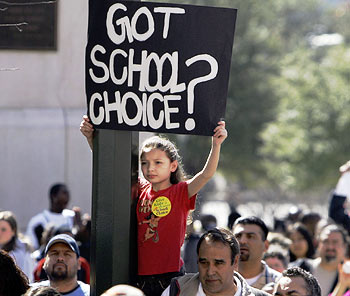Let’s understand why school choice is important. As in the free marketplace, competition creates better schools, public as well as private, better teachers, and thus reforms education- unlike pouring billions of dollars of taxpayer money into public schools to get nothing in return, which is what we do now. School vouchers do not carry any additional expense for a state because they primarily transfer money between schools, a fact that worries most union-loving Democrats because taxpayer money would likely be diverted from failing public schools to charter and private schools.
Advocates of school choice had three good reasons to rejoice within the past week. As reported here, on Capitol Hill, while House Democrats voted to protect public sector unions, Republicans passed the SOAR Act, which followed through with their pledge to reinstate the DC Opportunity Scholarship Program, the hallmark school choice program for low income children in the nation’s capital. While it remains to be seen whether the Senate will vote to pass the SOAR Act and, if so, whether the President will sign onto it, the Republicans are sticking to their conservative agenda and using their constitutional authority to promote reform of education through an expansion of charter schools and private school vouchers.
Meanwhile, taking the lead among the states, Indiana’s Republican-led state House passed the most expansive school voucher program in the nation, pushing ahead with school choice not just for low-income families, but for those in the middle-income bracket as well. Parents earning up to $60,000 will be eligible for vouchers and, within several years, there will be no limit on the number of children who can receive them. Despite a five-week walkout to Illinois by Indiana state House Democrats, the bill is likely to pass since Republicans control both Houses and the governor’s seat.
The third portion of this triple crown lies in a positive, but painfully narrow, decision by the Supreme Court. On April 4th, the nation’s highest court decided, in Arizona Christian School Tuition Organization v. Winn, that tax credits that pay for children to go to church-affiliated schools cannot be challenged on constitutional grounds.
The 5-4 decision upheld Arizona’s dollar for dollar tax credit, up to $1,000 per couple, for those who donate to organizations that, in turn, pay tuition for students attending private and parochial schools.
[youtube weipY6rpMss]
According to the Wall Street Journal, a group of taxpayers sued claiming violation of the First Amendment, that religion was being supported with taxpayer monies. Justice Anthony Kennedy, writing the majority opinion, ruled that the litigants were not harmed due to the tax credits, because tax credits are not equivalent to spending programs. Justice Kennedy wrote that the litigants’ claim assumes “that income should be treated as if it were government property even if it has not come into the tax collector’s hands.”
While this decision is a victory for school choice advocates, what is disturbing about it, as the WSJ points out, is that four Supreme Court justices- President Obama’s two nominees included- do, in fact, believe that taxpayer income is the government’s property even as it is being earned! Justice Elena Kagan’s dissenting opinion states that there is no difference between appropriations and tax credits.
While the high court’s decision contributes in a big way to last week’s triple victory for school choice and, ultimately, education reform, it is also a jarring reminder that the Supreme Court is but one vote away from forbidding school choice where church-based schools are concerned, and from declaring that all money earned by taxpayers belongs, first, to the government.

COMMENTS
Please let us know if you're having issues with commenting.